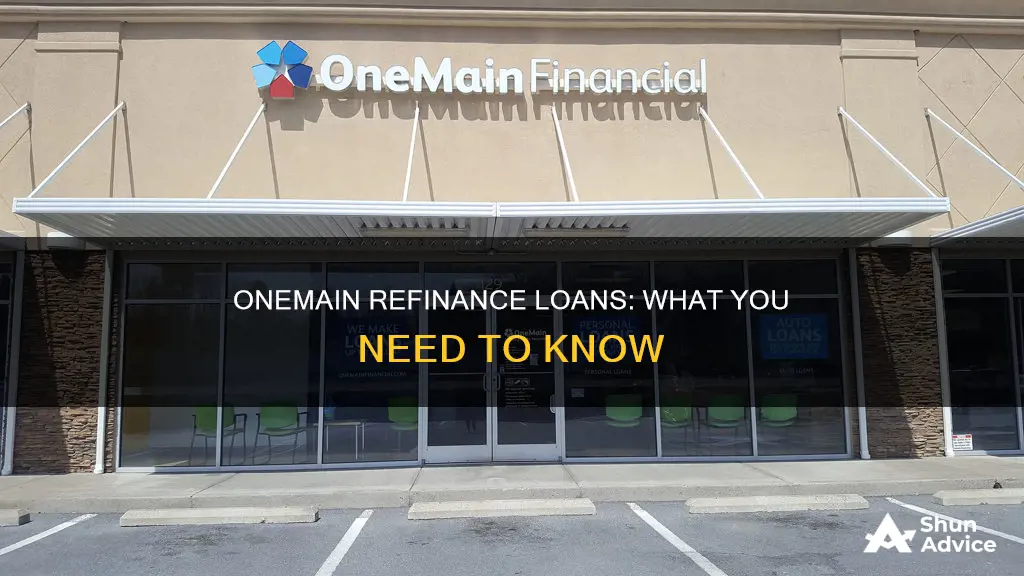
OneMain Financial offers refinancing options for personal and car loans. Personal loans can be used for debt consolidation, emergencies, home improvements, and more. The company also provides auto loan refinancing, which can help lower interest rates and monthly payments. When refinancing a personal loan, individuals essentially obtain a new loan with different terms to pay off their existing loan. This can result in lower monthly payments, either through a reduced interest rate or an extended repayment period. However, it is important to consider the potential trade-offs, such as the possibility of paying more in total interest over the life of the loan due to an extended repayment term.
| Characteristics | Values |
|---|---|
| Loan type | Personal loan, auto loan |
| Loan terms | Loan renewal, new loan with new loan terms |
| Benefits | Lower monthly payments, lower interest rate |
| Application | Online, in-branch |
| Timing | Depends on the number of documents needed, verification time, collateral |
| Eligibility | Secured or unsecured, eligibility requirements for secured loans include the condition and age of the motor vehicle and proof of insurance |
| Fees | Low minimum late fees, high origination fees, high APRs |
| Co-applicants | Allowed |
What You'll Learn

OneMain Financial offers refinancing for car loans
When considering refinancing your car loan, it is important to look for a new loan with a lower interest rate than your current loan. You should also check whether your current loan has a variable or fixed rate. Choosing a loan with a fixed rate, like a OneMain personal loan, has the benefit of staying the same so you don't have to worry about it rising in the future.
The process of refinancing a car loan with OneMain Financial is straightforward. You can complete the online loan application in just a few minutes and see your offers. After final loan approval, signing your closing documents takes about 30-45 minutes. Once the agreement is signed, the original loan will be paid off, and the new payment agreement will usually begin the following month.
It's important to note that refinancing your car loan may cause a small dip in your credit score, as it would with any hard inquiry. Additionally, if you are close to paying off your existing car loan, refinancing may not be worth it as the money saved in interest payments could be offset by fees associated with paying off the existing loan and/or opening a new one.
Overall, OneMain Financial's car loan refinancing option can be a great way to help you reach your financial goals and free up money for other expenses.
Ocwen's Loan Origination: What You Need to Know
You may want to see also

Pros and cons of refinancing a car loan
OneMain Financial offers personal loans that can be used for car loan refinancing. Refinancing a car loan can have several benefits, but it is not a one-size-fits-all solution. Here are some pros and cons to consider:
Pros
- Lower interest rates: If your credit score has improved since you first took out your loan, you may qualify for a lower interest rate on a new loan. This can reduce your monthly payments and save you money over the life of the loan.
- Fixed interest rate: Moving from a variable rate to a fixed rate can help you avoid potential increases in interest rates in the future.
- Lower monthly payments: Refinancing can help you lower your monthly payments, freeing up cash flow for other priorities or emergencies.
- Accessing equity: Refinancing can help you access the equity in your car, providing emergency cash or funds for other priorities.
Cons
- Higher interest rates: If your credit score has dipped since you took out your original loan, you may not qualify for a lower interest rate and could end up paying more in interest over the life of the loan.
- Negative equity: If your car depreciates faster than you pay down your loan, you may end up owing more on the loan than the car's market value. This is known as negative equity.
- Fees: Refinancing typically involves fees such as origination, processing, and application fees, which can offset any savings you might achieve.
- Longer loan term: While extending the term of your loan can lower your monthly payments, it may result in paying more interest over the life of the loan.
OnDeck's Startup Loan Options: What You Need to Know
You may want to see also

Refinancing can help lower interest rates and monthly payments
OneMain offers refinancing options for personal loans and car loans. Refinancing a loan means getting a new loan with new terms to pay off an existing loan. Refinancing can help lower interest rates and monthly payments in a few ways.
Firstly, refinancing can help you secure a lower interest rate. When interest rates fall, refinancing an existing loan for a new loan with a lower interest rate can reduce monthly payments and save you a substantial amount of interest over time. For example, a $100,000, 30-year fixed-rate mortgage with an interest rate of 7% has a principal and interest payment of $665. That same loan at 5% reduces the payment to $536.
Secondly, refinancing can help you switch from an adjustable-rate mortgage (ARM) with a variable interest rate to a fixed-rate mortgage. While ARMs often start with lower rates than fixed-rate mortgages, they can lead to higher rates in the future. By refinancing to a fixed-rate mortgage, you can avoid these future interest rate hikes and lock in a lower rate for the remaining term of the loan.
Thirdly, refinancing can help you extend the term of your loan, which can reduce your monthly payments and make them more manageable. For example, you could change the term of your mortgage from 30 years to 15 years, which may only slightly change your monthly budget while helping you pay off your loan faster. However, it's important to note that a longer loan term may result in paying more interest over the life of the loan.
Finally, refinancing can provide you with an influx of cash that can be used for other expenses or financial emergencies. This can be achieved through cash-out refinancing, where you take out a mortgage larger than you currently owe, pay off the old mortgage, and keep the remainder in cash.
When considering refinancing, it's important to compare offers from multiple lenders and weigh the pros and cons. Refinancing can involve significant closing costs and fees, so it's essential to calculate these costs and determine if the potential savings outweigh these expenses. Additionally, refinancing may cause a small dip in your credit score, but this is usually temporary, and your score will adjust over time.
O'Reilly Auto Parts: Tool Lending and More
You may want to see also

Refinancing may lead to a small dip in credit score
OneMain offers refinancing options for personal loans and car loans. When you refinance a personal loan, you are essentially getting a new loan with new terms to pay off your existing loan. This can help lower your monthly payments by reducing the interest rate and extending the loan term.
However, refinancing may lead to a small dip in your credit score due to hard inquiries on your credit report. Hard inquiries occur when lenders check your credit score and history as part of the loan application process, and they can remain on your credit report for up to two years. While each hard inquiry can cause a slight drop in your credit score, multiple inquiries within a short period can further increase the negative impact.
To minimize the impact on your credit score, it is advisable to compress all inquiries into a short time frame, typically within a 14- to 45-day window. Additionally, ensure that you continue making timely payments on your old loan until the new loan is approved. If you skip the last payment on the old loan, it could be considered a late payment, negatively affecting your credit score.
While refinancing may cause a temporary dip in your credit score, the benefits of lower monthly payments and interest rates can often outweigh this minor setback. Over time, as you make on-time payments on your new loan, your credit score may recover and even improve as you demonstrate your ability to handle the new loan effectively.
Main's Consolidation Loans: What You Need to Know
You may want to see also

OneMain Financial allows co-applicants for personal loans
OneMain Financial offers personal loans of up to $20,000 with fixed rates and payments to help consolidate debt or fund a major purchase. When you refinance a personal loan, you get a new loan with new terms and use that money to pay off your existing loan. OneMain Financial refers to this process as "loan renewal".
Refinancing a personal loan can help lower your monthly payments by reducing the interest rate or extending the loan term. This can provide financial flexibility and make your monthly payments more manageable. However, it's important to remember that a longer loan term may result in paying more over the life of the loan.
When considering refinancing a car loan with OneMain Financial, look for a new loan with a lower interest rate than your current loan. Opting for a fixed-rate loan ensures that the rate remains the same, providing stability and peace of mind. The application process for a personal loan with OneMain Financial is quick and convenient, allowing you to access funds as soon as one hour after loan closing.
Title Loans in Ohio: What You Need to Know
You may want to see also
Frequently asked questions
Refinancing is when you take out a new loan with new terms and use that money to pay off your existing loan.
There are several reasons why you might want to refinance a personal loan. These include:
- Your credit score has improved and you may qualify for a lower interest rate.
- You want to switch to a fixed interest rate to save money.
- You want to lower your monthly payments.
- You've found a better deal with another lender.
A pro of refinancing a car loan is that you may be able to benefit from new terms such as a lower interest rate or monthly payment. However, a con is that your credit score may take a small dip.
Yes, OneMain charges low minimum late fees and high origination fees.
The APR for OneMain loans ranges from 18% to 35.99%, with the average borrower paying less than 26%.







